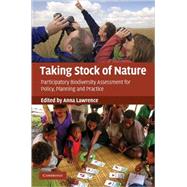
Note: Supplemental materials are not guaranteed with Rental or Used book purchases.
Purchase Benefits
Looking to rent a book? Rent Taking Stock of Nature: Participatory Biodiversity Assessment for Policy, Planning and Practice [ISBN: 9780521876810] for the semester, quarter, and short term or search our site for other textbooks by Edited by Anna Lawrence. Renting a textbook can save you up to 90% from the cost of buying.
| What does participatory biodiversity assessment mean for planners and policy makers? | |
| Monitoring and assessment of biodiversity under the Convention on Biological Diversity and other international agreements | |
| The Millennium Ecosystem Assessment: a multiscale assessment for global stakeholders | |
| Conservation of biological diversity in El Salvador shade coffee: the importance of taxonomic capacity for participatory assessments | |
| Taking stock of nature in species-rich but economically poor areas: an emerging discipline of locally-based monitoring | |
| Researching local perspectives on biodiversity in tropical landscapes: lessons from ten case studies | |
| Participatory resources monitoring in SW China: lessons after five years | |
| Forest inventory in Nepal - technical power or social empowerment? | |
| Perceptions of landscape change in British Columbia's Northwest: implications for biodiversity and participatory management | |
| How thousands planned for a billion: lessons from India on decentralized, participatory planning | |
| Inside monitoring: a comparison of bird monitoring groups in Slovenia and the United Kingdom | |
| The personal and political of volunteers' data: towards a national database in the UK | |
| Improving forest management through participatory monitoring: a comparative case study of four community-based forestry organizations in the Western United States | |
| Conclusions: towards effectiveness in participatory biodiversity assessment | |
| Table of Contents provided by Publisher. All Rights Reserved. |
The New copy of this book will include any supplemental materials advertised. Please check the title of the book to determine if it should include any access cards, study guides, lab manuals, CDs, etc.
The Used, Rental and eBook copies of this book are not guaranteed to include any supplemental materials. Typically, only the book itself is included. This is true even if the title states it includes any access cards, study guides, lab manuals, CDs, etc.